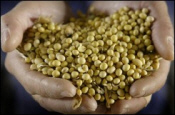



GMO Zero Tolerance Devastating For EU Livestock Feed
EU - Coceral, the European grain and feedstuffs traders and Fefac, the EU compound feed manufacturers welcome the new EU Commission report on the economic impact of unapproved GMOs, which concludes on the “need to take urgent action to avoid negative implications for EU livestock production and agriculture overall”.
JeanMichel Aspar, Coceral President, stated that “the present strict zero-tolerance policy of the EU is disproportionate and will lead to a complete halt of vital feed supplies from South and North-America, as no trading company will bear the risk of guaranteeing absence of traces of GMOs approved in some third countries but not yet in the EU”.
He stressed that “the EU is totally dependant on soybean meal imports as major source of vegetable proteins, for which no substitutes are available in sufficient quantities on EU or world markets”.
Major feed cost increase
Pedro Corrêa de Barros, Fefac President, stressed that the current de-facto import ban for corn gluten feed will increase feed costs to the EU livestock industry by another €60-90 million at a time of record-high feed grain prices.
He pointed out that “a similar ban on soybean meal imports will have devastating consequences for European livestock producers, wiping out entire pig and poultry production chains in the EU
Safeguard viable livestock industry
Coceral and Fefac have therefore called on the EU Farm Council to safeguard a viable livestock industry in the European Union, which accounts for 40% of the farm revenues, by ensuring reliable access to vital feed material imports.
As demonstrated in the DG-AGRI study, the “CAP Health check” objectives of a more competitive and sustainable EU agriculture cannot be achieved unless solutions are found to address the issue of unapproved GMOs.
Toolbox ingredients
Coceral and Fefac take the view that a “toolbox” with the following key elements is necessary to re-establish normal trading patterns ensuring a regular supply of high-quality feed materials for the European livestock industry:
- aligning the speed of the GMO authorisation procedure between the EU and the major exporting countries;
- a risk proportionate, workable tolerance for the low level presence of products that have obtained a positive EFSA opinion or have been approved by another OECD country to be present in cargoes of traded feed materials.











